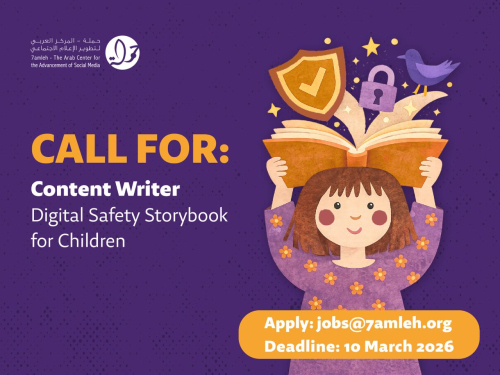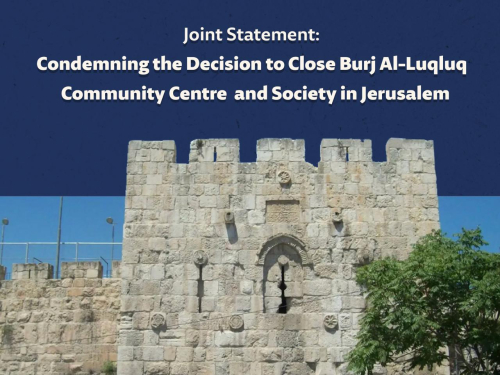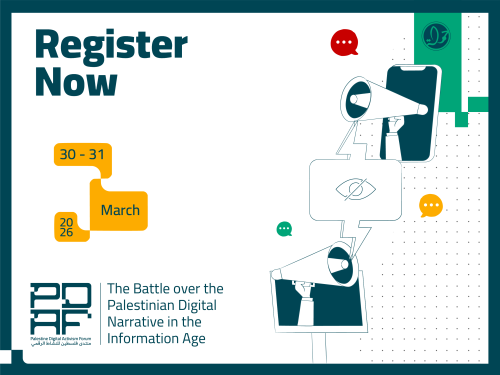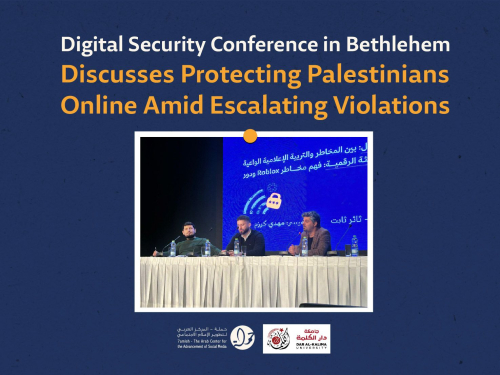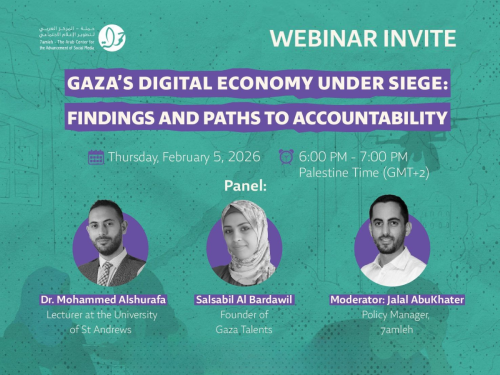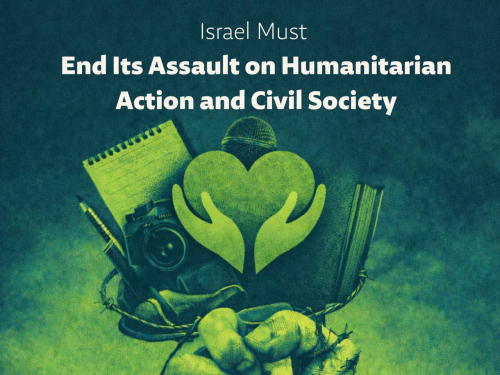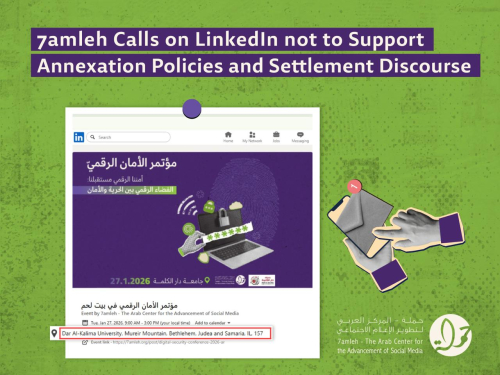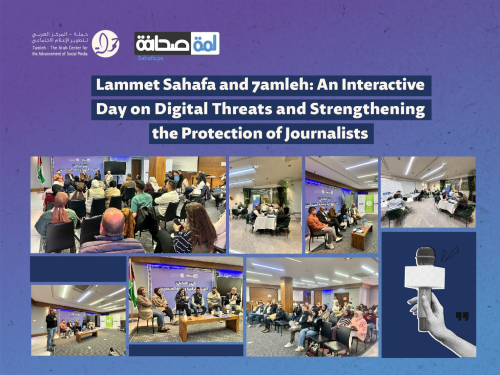
Haifa, Ramallah, Gaza, 19 May. Today, 7amleh - the Arab Center for the Advancement of Social Media concluded the sixth edition of its annual Palestine Digital Activism Forum 2022. The forum saw wide local, regional and international participation. More than 1300 participants joined the conference via Hopin, and more than 300.000 viewers tuned in on social media platforms. More than 120 speakers joined the virtual forum from around the world, as part of 50 digital events and in partnership with 60 local, regional and international partner organizations. This year’s forum was able to transcend barriers and borders, bringing together Palestinians inside and outside of Palestine, in the diaspora and refugee camps, turning to intersectional struggle as an approach to position Palestinian digital rights within the the regional and international contexts.
The digital forum was conducted over 3 days, under the theme of “Digital Solidarity for Justice.” It aimed to shed light on issues of digital solidarity in the regional and international context, especially following an eventful year for Palestinians at the international level, as Palestinians worked to expand global solidarity movements, and optimize the digital space for justice. The forum consisted of a series of political sessions, digital talks, and training workshops, which created a space to discuss numerous different and exciting topics.
The forum welcomed speakers from local, regional and international organizations, alongside representatives from different tech companies, such as Facebook, Instagram, WhatsApp, Clubhouse, Wikipedia, and the Head of the Meta (formerly Facebook) Oversight Board, as well as Mary Lawlor, the UN Special Rapporteur on the situation of human rights defenders, and government representatives such as the Palestinian Minister of Communications and Information Technology, U.S. Congresswoman Rashida Tleib and Danish Parliament Member Uffe Elbæk, in addition to academics, civil society representatives and experts in the field.
Motivational Speakers
Multiple motivational speakers and policy makers joined this year’s forum, including Palestinian American U.S. Congresswoman Rashida Tlaib, UN Special Rapporteur on the situation of human rights defenders Mary Lawlor, and Palestinian Minister of Communications and Information Technology Dr. Ishaq Seder, Danish Parliament Member Uffe Elbæk, as well as Palestinian activist Muna El-Kurd and Palestinian American Activist Linda Sarsour, along with prominent academic Marc Owen Jones, author of Digital Authoritarianism in the Middle East.
Political Sessions on the Opportunities and Challenges of Digital Activism and Solidarity at the Palestinian, regional and internationallevel
16 political sessions were held at the forum, addressing a variety of topics in digital activism and solidarity. The opening session discussed the role of digital activism and solidairty in bringing the Palestinian issue back to the center. Speakers shed light on the role of Palestinian activists, who in telling their stories, were able to influence world opinion and re-center the Palestinian cause. Other sessions discussed the impact of misinformation on social media on digital solidarity with human rights issues, privacy in the digital age, Facebook’s Arabic and Hebrew content moderation policies, the role of global digital solidarity in changing Facebook’s policies with speakers from Kashmir, Colombia and Palestine, as well as the impact of social media policies on solidarity in the digital age, and a closing Q&A session with Thomas Hughes, the Head of the Facebook Oversight Board.
On the second day, 5 political sessions were held, discussing the gap in Internet accessbility for Palestinians and digital discrimination they face and its implications, and the role of alternative media platforms in supporting digital activism and solidairty in the Arab world, illlustrating key experiences, opportunties and challenges of Palestinian and Arab independent media organizations. The third session “The Use of Surveillance Technologies against activists and Human Rights Defenders'' tackled the coalition that worked intensively on the “Pegasus” project last year and its implications, including engendering self-censorship, and shrinking spaces for freedoms and rights around the world. Other sessions focused on economic digital discrimination and its impact on Palestinian solidarity, and the last session titled “Digital Rights from a Feminist Liberation Perspective – How to Create a Safe Digital Space for Women?” focused on safe digital spaces for women from a feminist liberation perspective.
In the final day of the Forum, two sessions were held, the first focusing on hate speech in the Arab world, and the different forms of hate speech users in the region encounter on social media, with focus on certain types such as sectarian, political and misogynistic hate speech, and how hate speech online can be combated. Finally, the last session brought together a group of Palestinian youth, coming from the majority of places where Palestinians are most concentrated in the world, who discussed the role of social media platforms in enhancing communication between each other, and the impact of such communication on the coordination of the Palestine solidarity movement, and advancing communication and solidarity among Palestinians themselves.
Virtual Talks: From Digital Activism, to Free Knowledge, to Memes
In addition to political sessions, we organized a number of talks on a variety of topics. One talk explored Arab users positions towards the Palestinian case on Twitter during the Sheikh Jarrah uprising in May 2021. Another discussed the occupation and the Metaverse, and its role in reinforcing digital discrimination against Palestinians. Further, in an exclusive talk, the head of Human Rights at Wikimedia, Cameran Ashraf discussed Wikipedia’s role in advancing human rights and access to knowledge. The last talk shed light on the potential of memes as a tool for campaigns and advocacy on social media platforms.
Professional Capacity Building Workshops for Participants
17 interactive and unique workshops were organized at this year’s forum. They aimed to build the participants' capacity, and targeted human rights defenders, journalists, trainers, civil society organizations and workers, students and content creators. The workshops were delivered by local, regional and international trainers, and addressed a variety of topics, such as digital security for activists and organizations, ways to use different platforms, such as Instagram, Facebook, Twitter, Clubhouse, and WhatsApp to build and expand digital solidarity movements and communities to achieve justice. Other workshops focused on using photography and podcasts as tools to document human rights violations, data storytelling in campaigns, and fact-checking misleading news with an emphasis on ‘deep-fake’ technologies, along with a variety of different workshops.
Similarly to previous years, this year’s forum was able to transcend barriers, borders and material obstacles that fragment Palestinians and try to divide and erase them in the digital space. The forum provided a space for Palestinians and pro-Palestinians to come together, and discuss the obstacles and restrictions they face in the digital space, and generate positive and effective ideas on how to bypass such restrictions, and utilize all available resources in the digital space in the service of their cause and Palestinian narrative, and to rally support and solidarity on all level in creative and innovative ways.
Related Articles
Subscribe to Our Email Alerts
And stay updated with our latest activities, news, and publications!

